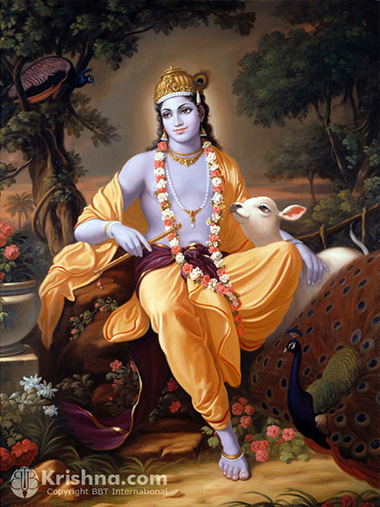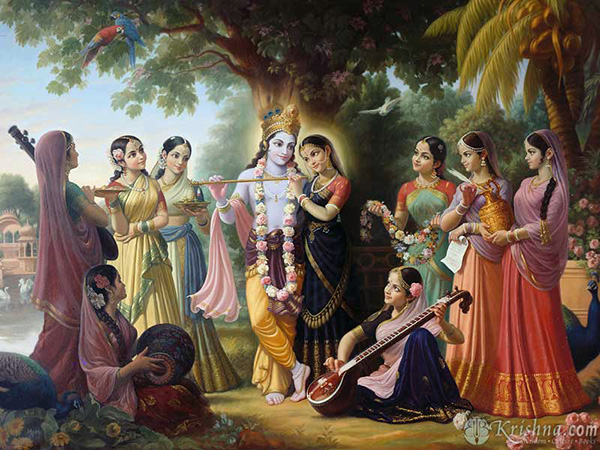
Krishna means “all attractive”. He possesses all qualities – beauty, knowledge, strength, wealth, fame and renunciation – in full, unlimited. So, He is the “all attractive” person, Krishna. In the brahma-samhita, Brahma, the first created being, prays:
venum kvanantam aravinda-dalayataksam
barhavataram asitambuda-sundarangam
kandarpa-koti-kaminiya-vishesa-shobham
govindam adi-purusham tam aham bhajami
“I worship Govinda, the primeval Lord, who is adept in playing on His flute, with blooming eyes like lotus petals with head decked with peacock’s feather, with the figure of beauty tinged with the hue of blue clouds, and His unique loveliness charming millions of Cupids.” [Brahma-samhita Text 5.30]
Krishna is the Supreme Person, the Godhead.
Krishna is the speaker of the Bhagavad-gita, recognized throughout the world as one of mankind’s greatest books of wisdom. In the Gita, as it is also known, Krishna says repeatedly that He is God Himself, the source of everything.
Arjuna, to whom Krishna is speaking, accepts Krishna’s words as true, adding that the greatest spiritual authorities of that time also confirm that Krishna is God. Traditions that follow in the line of these authorities have carried Krishna’s teachings down to the present day.
Love for Krishna resides eternally in the heart of every soul. It is reawakened by hearing and chanting about Krishna. When that love is awakened and attains its purest stage, the soul returns to Krishna and lives with Him eternally, never to return to this world again.
Spiritual life is based on the exchange of love, or Bhakti. Pure Bhakti attracts God. Krishna likes it best when the Bhakti is so pure it isn’t touched by feelings of awe and reverence toward Him.
That type of love allows for the greatest intimacy. Krishna is most attracted by intimate love: a love that loves Krishna just because He is so wonderful, not because He is God and deserves or commands our love.
Each soul has a unique relationship with Krishna in one of five moods:
- with feelings of awe and reverence
- as a servant or one who gives protection
- as a friend
- as a parent or elder
- as a lover

Lord Sri Krishna speaking to Arjuna the science of self-realization.
The person-hood of Krishna is not an idea invented by human beings naively creating a God in their own image. Nor is person-hood a limiting concept when applied to God, or the Absolute Truth. As the source of everything, Krishna naturally has His own personal identity, just as each of us does. The Vedas define God as the one supreme conscious being among all other conscious beings. He is infinite, we are finite, and He maintains us all.
Naturally, the best way to understand God is to learn from Him. In the Bhagavad-gita (“The Song of God”), Lord Krishna—a real, transcendental person—tells us that He is God and reveals many things about Himself.
“Unintelligent men, who do not know Me perfectly, think that I, the Supreme Personality of Godhead, Krishna, was impersonal before and have now assumed this personality. Due to their small fund of knowledge, they do not know My higher nature, which is imperishable and supreme.”—Sri Krishna, Bhagavad-gita 7.24
Many people have a hard time conceiving that God can be an actual person. But the Vedas tell us that God’s unique personal identity is His highest aspect. Here’s an analogy to show how God has three main features.
Looking at a mountain from a distance, we can make out only its size and shape. This is compared to comprehending God only as Brahman, His impersonal energy, which emanates from Him just as light shines out from its source.
As we move closer, we’ll start to make out more of the mountain’s characteristics—the colors of its foliage, for example. This is compared to understanding that God is within our hearts as Paramatma, or the Supersoul.
Finally, when we arrive at the mountain we can explore its soil, vegetation, animals, rivers, and so on. This is compared to understanding God the person, or Bhagavan.
Bhagavan is the source of Brahman and Paramatma and is therefore, in a sense, one with them. In the Srimad-Bhagavatam, Brahman, Paramatma and Bhagavan are called the three phases of the Absolute Truth.

